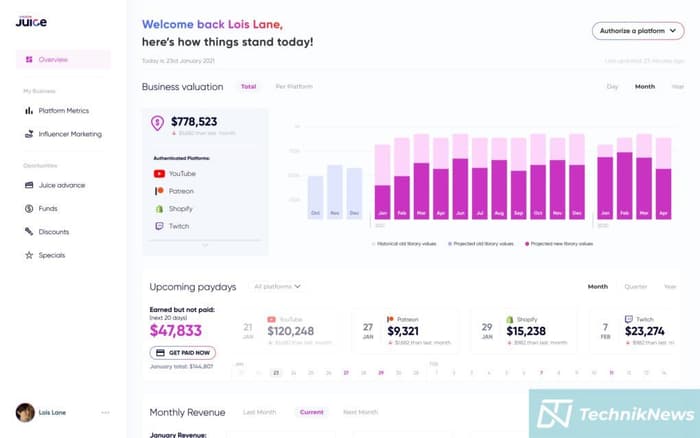Share
Fintech in the age of the influencer
Oct 13, 2021

The first time I remember the word “creator” being a thing, was around 2007, when YouTube first allowed creators to earn money on their content based on ad revenue.
Before that, I associated creators as the celebrities and artists that I saw in magazines or watched on television. The Lady Gagas and Kanye Wests who signed huge record deals, held huge concerts, and had Hollywood connections. At the time, only those select few had the resources available to produce and publish content and thus only they could make a full-time living creating content.
But with the rise of the internet, this all changed. Anyone could make a song or video and start uploading content that millions of people around the world could view. The first social media platforms like Facebook, Twitter, Snapchat, and Instagram meant anyone could become a videographer, actor, or singer. The next wave of platforms —TikTok, Patreon, Sustack, etc — pushed this even further, making it even easier for creators to produce content, get discovered, and find their first 1000 true fans.
Creators are increasingly becoming full-fledged businesses with several revenue streams, including newsletters, merchandise, premium content, e-books, consulting, and much more. Bloggers, videographers, social media influencers, and YouTubers are now founders - building teams, creating tools, generating merchandise, and building a real business. Some of the highest-paid YouTubers, including Ryan Kaji, MrBeast, and gamer Preston Arsement all have a team of 30+ people behind their channels and make millions a month in revenue.
As a result, creators are some of the fastest-growing types of small businesses. But there’s a problem: although many of these creators have millions of followers and make six figures every year, they’ll still struggle to get a mortgage, sign a lease, or even get paid on time. Alexandra Botez, an influencer who earns six figures playing chess on Twitch, got rejected twice for a business credit card. The YouTuber behind TierZoo, who has over 2.7 million subscribers, couldn’t rent an apartment because the landlord didn’t view his business as legitimate.
The creator economy represents a $100 billion+ market, but they aren’t being catered to effectively; traditional financial institutions don’t come close to meeting the needs of the modern-day creator.
As Sima Gandhi, CEO of Creative Juice highlights, “Creators are the next generation of small businesses - nearly 40% of creators are making over $50k per year. Yet these creators aren’t understood by traditional financial services. YouTube alone paid nearly $10B to creators in 2020 alone. These creators are so financially successful, but in many ways are underbanked.”
The good news is that fintech companies are starting to address many of those creator pain points.
Current pain points of the creator economy
If you approach a bank and say you have 1 million followers on Instagram, they would have no clue what to do with that information. But if you go to one of the emerging creator-focused fintech companies instead, they’ll be able to process that info and translate it into financial terms.
Let’s dive a little deeper into the specific problems creators face and which fintech companies are working on them:
Not having everything in one place
Many creators currently use a combination of Gmail, Excel, Wise, Notion, and several other tools to track their various income streams.
Creative Juice is a fintech company that is addressing this issue by building a comprehensive dashboard. With Juice, creators put all the important information a creator needs on one screen, making it easy to assess and track how a business is doing at a glance.

They’re even launching a product that allows their more well-known creators to invest in emerging creators with Juice Funds - allowing YouTubers like MrBeast to offer advice to a fellow YouTuber, and then cash in on their success through investment.
I wish there was a way to invest in social media influencers! Idk anything about the stock market and I find it boring.
— MrBeast (@MrBeast) December 1, 2020
Juice is not the only company that’s building an all-in-one solution. Stir is also creating products that help creators split revenue across projects, manage their accounting in one place, and enable instant bank to bank payments.
Lack of credit
Modern-day freelancers and creators know the struggle of getting credit when living off an unstable income. Traditional financial institutions don’t build financial products for people living on a variable income.
Fintech companies like Karat offer credit products specifically for creators. Their main product is the Karat Black Card, a credit card partnered with Stripe that doesn’t charge interest or annual fees.
Karat’s premise is to use alternative data to help creators take out a mortgage, file taxes, and get a loan. Creators also have access to a dashboard where they can aggregate all sources of income into one platform to give them loans based on future income.
Karat’s goal is to build out the financial infrastructure for creators, going as far as helping them launch merchandise, incorporate businesses, and set up payroll. Another company working on this problem is Oxygen, which also offers a personal bank account along with cashback, travel perks, and more.
Getting paid on time
Every creator has a story of a sponsor or brand that took far too long to pay. Many large companies pay late or take advantage of the fact that creators are not employees. This payment structure causes problems, as it makes creators’ income even more unstable and unreliable.
Fintech companies have stepped up and are solving this specific problem by advancing invoices at a small fee. Lumanu, a banking product for influencers, recently launched EarlyPay, a feature that allows creators to get paid in minutes, so they don’t have to wait 30 or 60 days. Other fintech companies such as Willa are solving this with their own automated collection system and a 2.9% fee for upfront payment. They’ve had tremendous success so far and currently hold a 150k strong waiting list.
These companies also include other essential services such as tax filing, expense tracking, and anything else that helps manage a small business. The goal is always to simplify the business and financial side of things as much as possible, so creators can spend more time creating and less time managing admin.
How to onboard creators as SMBs
Fintech companies cater to the new wave of SMBs by looking further than bank statements, credit scores, and credit history. Instead, they put a larger onus on using more data sources and alternative data — like follower count, engagement stats, social media presence — to truly understand the businesses. The result? More influencers are given a chance to scale, create more content, and inspire others. By removing the admin and financial stress of being a creator, fintech companies can help anyone make a full-time living doing what they love and are talented at — something we can surely celebrate.
Want help adding alternative data sources into your onboarding processes?
Alloy connects with over 100 data sources to help you validate and onboard creators quickly and securely.




